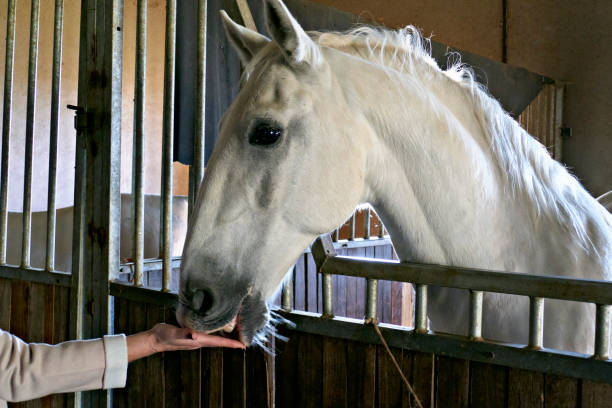Horses can bite or nip. This dangerous behavior can lead to serious injury. Horses can still eat grass, but they have strong jaws and incisors that are pretty sharp. This behavior is very different from winding, Cribbing or fence eating.
Biting could also indicate a health problem in your horse, or a socialization issue where it is too familiar with people. 1
Why do horses bite?
Horses may bite in pasture to defend their horses, their food, or offspring. They also use it to discipline young horses or those that are lower in the pecking list, or show anger or frustration. You might also bite for the following reasons:
Aggression
Horses that are aggressive or have a lot of energy can bite. Particularly stallions can be dangerous biters. Stallions can be dangerous biters and should be avoided by beginning horse owners.
Allogrooming
Allogrooming, when horses are groomed together, is another instance in which one horse might bite another horse. It happens especially at the top of the neck and withers. This behavior can be emulated by scratching at these areas.
Your horse should not be allowed to start allogrooming with its handler. Also, your horse shouldn’t be allowed to groom you. Push your horse away from its face if it attempts to groom you while you are brushing it. Allogrooming is not meant to be a threat to horses, but a behavior that is inappropriate to engage with humans.
Tight Girth or a uncomfortable saddle
Horses will nip when the girth of the saddle or the cinch are too tight or too fast. In anticipation of discomfort, horses may lash out if the saddle isn’t fitted properly.
You must be able to trust your horse when you saddle up and ride. You may need to adjust your saddle or girth.
Infection, discomfort or illness
Horses can bite when they are sick or unwell. If your horse has been acting strangely or suddenly, you should make sure they are healthy before you punish them for biting. To rule out any health issues, it is important to have your horse examined by a veterinarian.
How to Stop Biting
It can be difficult to retrain horses depending on how badly they bite. It is best to seek professional help if your horse is biting very badly.
You can also take these steps to avoid biting behavior:
- Clicker trainingAnother way to curb biting behavior is to get the horse to concentrate on an object. Horses who nip a lot have active minds that need to be kept busy. Clicker training is an excellent way to keep busy minds occupied.
- Biting can begin when the horse is young. Particularly colts youngster tend to explore the globe with their mouths. You should teach your horse to not touch your mouth if it is a young horse.
- Respect teaching: Young horses need to learn to maintain a distance from other horses and not to initiate contact. You might have to stop giving your horse treats until respect becomes a routine, if at all.
- Enrichment: Horses are grazers, and have a natural tendency to chew and use their teeth for most of the day. You should ensure your horse has plenty of grass or hay to keep him busy.
- Consistency: Your horse must be respectful of your space and not make contact with you, not even to touch your ears.
- Professional help needed If you have a horse that is aggressive, you will need to hire a professional trainer.

